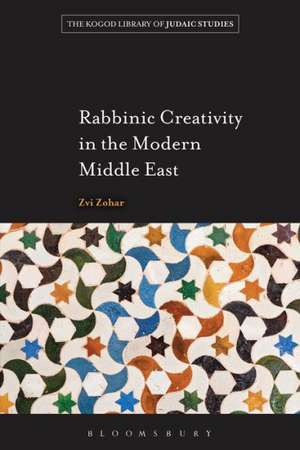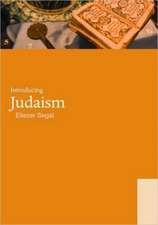Rabbinic Creativity in the Modern Middle East: The Robert and Arlene Kogod Library of Judaic Studies
Autor Zvi Zoharen Limba Engleză Paperback – 19 iun 2013
| Toate formatele și edițiile | Preț | Express |
|---|---|---|
| Paperback (1) | 262.54 lei 22-36 zile | |
| Bloomsbury Publishing – 19 iun 2013 | 262.54 lei 22-36 zile | |
| Hardback (1) | 895.19 lei 43-57 zile | |
| Bloomsbury Publishing – 19 iun 2013 | 895.19 lei 43-57 zile |
Preț: 262.54 lei
Preț vechi: 298.94 lei
-12% Nou
Puncte Express: 394
Preț estimativ în valută:
50.24€ • 52.58$ • 41.81£
50.24€ • 52.58$ • 41.81£
Carte disponibilă
Livrare economică 10-24 martie
Preluare comenzi: 021 569.72.76
Specificații
ISBN-13: 9781441133298
ISBN-10: 1441133291
Pagini: 416
Dimensiuni: 156 x 234 x 23 mm
Greutate: 0.61 kg
Ediția:New.
Editura: Bloomsbury Publishing
Colecția Bloomsbury Academic
Seria The Robert and Arlene Kogod Library of Judaic Studies
Locul publicării:London, United Kingdom
ISBN-10: 1441133291
Pagini: 416
Dimensiuni: 156 x 234 x 23 mm
Greutate: 0.61 kg
Ediția:New.
Editura: Bloomsbury Publishing
Colecția Bloomsbury Academic
Seria The Robert and Arlene Kogod Library of Judaic Studies
Locul publicării:London, United Kingdom
Caracteristici
A non-condescending portrayal of non-Western Jewish halakhic and religious thought in modern times
Notă biografică
Zvi Zohar is Chauncey Stillman Professor of Sephardic Law and Ethics at Bar Ilan University, where he teaches in the Faculty of Law and the Faculty of Jewish Studies. At the Shalom Hartman Institute, Prof. Zohar heads the Alan A. and Loraine Fischer Family Center for Contemporary Halakha. He has published over 60 scholarly articles in Hebrew, English and French, as well as several book-length studies in Hebrew, including: Tradition and Change: Halakhic Responses of Middle Eastern Rabbis to Legal and Technological Change; The Luminous Face of the East - Studies in the Legal and Religious Thought of Sephardic Rabbis of the Middle East; and A Socio-Cultural Drama in Aleppo in the French Mandatory Period. His previous publication with Continuum [written with Avi Sagi] is Transforming Identity, on the history and development of Judaic norms concerning conversion.
Cuprins
Introduction 1. New Horizons - Aspects of the Halakhic Creativity of Rabbi 'Abdallah Somekh 2. Iraqi Rabbis and Ashkenazic Halakhic Literature 3. The Sephardic Halakhic Ethos according to Iraqi Rabbinic Leaders 4. Rabbinic Scholars of Aleppo in the Modern Era: Conservatism as a Core Cultural-Religious Value 5. Rabbi Yitzhak Dayyan: A "Maskil" in Aleppo 6. "A Seal of Truth Which I Have Sought and Loved With All My Being": Aspects of the Halakhic and Religious World of Rabbi Shaul-Matloub 'Abadi 7. "There is none like this Arabic language upon the Earth."The Arabic Language and Oriental Culture through the Eyes of Rabbi Israel Moshe Hazan 8. Rabbinic Responses to transformations in the social life of Egyptian Jews 9. The Synagogue - Changes and Trends 10. Halakha, Suicide and Social Policy 11. Rabbanite-Karaite Intermarriage in Twentieth-Century Egyptian Halakha 12. Freedom Engraved on the Tablets General Bibliographic List Rabbinic Works Cited Index
Recenzii
No scholar has contributed more to our understanding of Sephardi rabbinical thought in the modern era than has Zvi Zohar, and at last, his wide-ranging study of the legal and religious creativity of Jewish spiritual leaders in Iraq, Syria, and Egypt during the nineteenth and twentieth century has appeared, not merely as a straight translation of his 2001 Hebrew original, but in a reworked and enhanced English version. With erudition and verve, Zohar convincingly shows that there was a very different response which was deeply and authentically rooted within Jewish tradition by Arabic- and Ladino-speaking scholars and communal leaders who were far more open to the modern world than were many of their Ashkenazi counterparts. The Eastern sages, rather than seeing modernity and technology as existential threats to be kept at bay by ever-more stringent regulations and increased communal isolation, saw them as challenges to be engaged calmly and creatively, but at the same time which had great potential for good. Zohar paints insightful portraits of men like Abdallah Somekh, Yitzhak Dayyan, Shaul Abbadi, Elijah Hazan, and Raphael Aharon Ben-Shim?on. He surveys their oeuvre, elucidates their thought, and explains their methodology with clarity and considerable empathy. Rabbinic Creativity in the Modern Middle East is an eloquent and salutary antidote to the all-too-widespread notion that the Judaism's encounter with modernity was an entirely Western phenomenon. The book is a signal contribution to Judaic Studies, Religious Studies and Modern Historical Studies.























